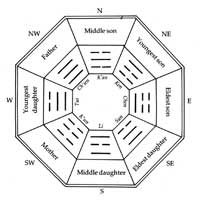|
|
||||
|
From profound
Chinese wisdom, the golden geomantic rules for |
||||
|
Feng Shui, literally meaning wind and water, is a term that reminds us of the characteristics of the environment in which we live: the mountains, valleys and water courses and their interaction determined by their forms, dimensions and positions. Feng Shui is an integral part of the ancient wisdom and cultural tradition of China; a geomantic science dating back almost 4000 years, in which components of philosophy, astrology, mysticism and Chinese folklaw intersect. The aim of this fascinating art is to create harmony with the environment in which we live and the energy currents that run through it, by seeking to find the right balance between the two essential energies of yin and yang, the feminine and the masculine, and the five elements of wood, fire, earth, metal and water. The principles of Feng Shui are used to choose favourable locations for buildings, the right directions for the different rooms, the interior design and arrangement of furniture and the placement of the garden, all with the aim of improving the quality of life for the dwellers. According to the masters of this science, positive Feng Shui can create prosperity, happiness in the family, success, good health and the potential for long life. On the other hand, negative Feng Shui can cause financial difficulties, arguments, sickness and accidents. To create a positive Feng Shui it is necessary to know how to use and position the Ba Gua, that is an octagonal symbol on which the principal directions (north, south, east and west) and the intermediate directions (northeast, northwest, southeast and southwest) are drawn and their eight trigrams from the I Ching, which allows us to interpret the directional symbols. Each direction is associated with an aspect of life and an element. North is the direction of career and also, according to some interpretations, of spirituality and its element is water. South is the direction of fame and reputation and the southern element is fire. East is the direction of family and health, and the corresponding element is great-wood. West is the direction of children, and the element is small-metal. Northeast is the direction of awareness and teachings and the element is small-earth. Northwest is the direction of influential people and sponsors, and the element is great-metal. Southeast is the direction which governs fortune and prosperity and the element is small-wood; and finally, the southwest is the direction of relationships and marital happiness and the element is great-earth. By knowing the directions and elements we can take the opportunity to create the best conditions in the environment in which we live as well as obtain success in the fields we desire. We can intervene with colours and objects to re-energise or correct the energetic currents of «chi» in the different zones of the house, and with simple changes we can positively «activate» the house or office in which we live. For example, to favour family life and wealth we can arrange plants in the east and southeast. In that same area or in the north, the presence of an acquarium, with the energy of moving water, brings unexpected benefits. To improve our career we can place in the north blue candles floating in a bowl of water, a composition which creates maximum equilibrium between yin (water) and yang (fire). The emotions and study can be improved by the correct positioning of a quartz crystal in the southwest or northeast zones. Lights are great emanators of positive Feng Shui, and to remedy a lack of fame and success, can be placed in the southwest and southeast sectors. To obtain the help of influential people, and for the birth of children, it is possible to place wind chimes in the west and northwest. These are only simple examples of how Feng Shui works; for deeper understanding we need to investigate the directions favourable for an individual (of which we will speak in a future article) and which points we choose for the position of the rooms, the bed, the entrance door etc. Four principal schools of Feng Shui have developed: the school of form, which focuses on the form and dimensions of a landscape; the school of compass, which works with the Ba Gua and the eight trigrams of the I Ching; the Black Hat sect, the more esoteric aspect of Feng Shui and Intuitive Feng Shui, in which all the rules of this science are secondary to the personal perceptions of the practitioner. This science is very popular in Taiwan, Hong Kong, Singapore and in the Chinese community in Malaysia, but it is spreading rapidly in the west where there are now many books available. If you would like to furnish or construct your home in harmony with the cosmos, it is however advisable to consult an expert. g.l.r. |
||||
|
|
||||


